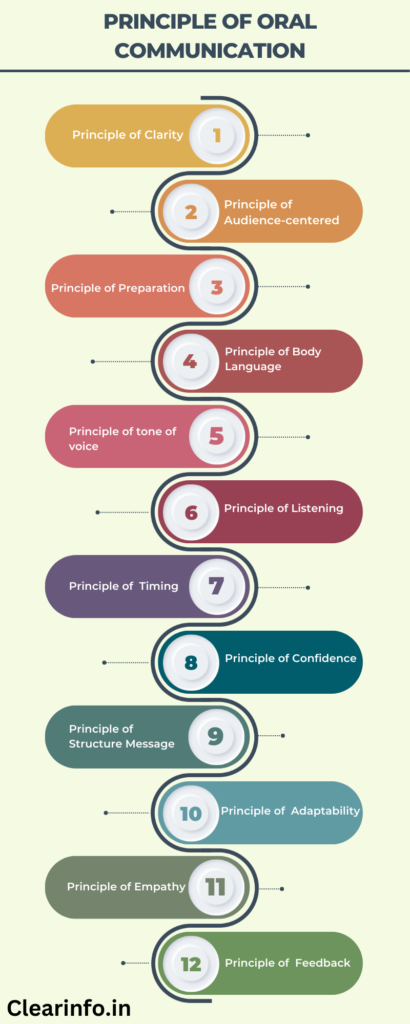Oral communication is an essential aspect of our daily communication, as it helps us express our ideas, thoughts, and emotions to others effectively. In this blog, we will explore the principles of oral communication that can help you become a more effective and persuasive communicator.
Oral communication and its importance in various contexts
Oral communication can be defined as the act of sharing thoughts and information by means of verbal expressions. It is an essential form of communication that plays a critical role in various contexts, including personal relationships, education, and business.
While written communication has its merits, oral communication offers several unique advantages, including the ability to convey emotions, establish a personal connection with the audience, and provide immediate feedback.
However, one of the disadvantages of oral communication is that it can be challenging to control the message once it has been delivered, unlike written communication, which can be revised and edited.
Despite its limitations, effective oral communication is essential for building relationships, achieving goals, and making an impact in various contexts.
Overview of Principles of oral communication

12 Principles of effective oral communication
Let’s explore the fundamental principles of oral communication and how they can be used to improve communication skills.
1. Maintain Clarity in communication: Speak clearly and concisely to ensure your message is easily understood by your audience. Use simple and understandable language, avoid jargon, and speak at a pace that is comfortable for your audience.
-Importance of speaking clearly and concisely
Clear and concise communication is essential for effective oral communication. When you speak clearly and concisely, you are able to convey your message in a way that is easily understood by your audience.
This becomes particularly crucial in scenarios where misunderstandings may lead to significant outcomes, particularly in professional environments.
Tips for achieving clarity in oral communication
- Speak clearly and enunciate your words.
- Ensure that your message is concise and straightforward.
- Use body language and eye contact to reinforce your message.
2. Audience-centered communication: Consider your audience’s needs, interests, and knowledge levels to ensure your message is relevant and engaging. Tailor your communication style and language to the audience you are addressing.
-Importance of considering the needs and interests of the audience
When it comes to oral communication, considering the needs and interests of your audience is crucial. No matter what your message is, if it does not resonate with your audience, it will not be effective.
Understanding the needs and interests of your audience can help you tailor your message to be more engaging and persuasive.
Tips for tailoring communication to the audience
- Consider the audience’s background, knowledge, and interests.
- Utilize language and illustrations that the audience can easily relate to.
- Adjust your tone and delivery to match the audience’s expectations and preferences.
3. Preparation: Adequate preparation is key to effective oral communication. Plan your message carefully, organize your thoughts, and practice your delivery to ensure you are confident and able to effectively convey your message.
-Importance of preparation in oral communication
Preparation is key to successful oral communication. It allows you to organize your thoughts and ideas, anticipate questions and objections, and tailor your message to the audience.
By preparing thoroughly, you can build confidence and reduce anxiety, enabling you to deliver your message with clarity and conviction.
Tips for preparing effectively for oral communication
- Define your objective and key message before you start preparing.
- Arrange your ideas and thoughts in a way that is both logical and easy to comprehend.
- Practice your presentation by paying attention to your tone, pace, and nonverbal communication functions.
4. Body Language: Non-verbal cues such as facial expressions, gestures, and posture can greatly enhance or detract from your message. Employ self-assured body language to communicate your message with effectiveness.
-Importance of nonverbal cues in oral communication
Nonverbal cues play a critical role in oral communication, as they can convey information and emotions that words alone cannot express. These cues include body language, facial expressions, tone of voice, and gestures.
Nonverbal cues can help to emphasize or reinforce oral messages, providing context and helping to convey the speaker’s emotions and intentions.
Related Readings: Non-verbal communication advantages and disadvantages
Tips for using body language effectively in oral communication
- Maintain good posture and avoid slouching or fidgeting.
- Use gestures to emphasize key points, but avoid overdoing them.
- Establish a connection and showcase confidence by maintaining eye contact with your audience.
5. The tone of voice: The tone of your voice can convey emotions and attitudes, influencing how your message is received. Use a tone that is appropriate to the message you are delivering.
-Importance of tone of voice in oral communication
The tone of voice in oral communication is crucial because it can convey a wide range of emotions, attitudes, and meanings. It can shape the listener’s perception of the speaker and their message.
A speaker’s tone can indicate sincerity, confidence, enthusiasm, sarcasm, anger, or sadness, among other things.
Tips for using tone of voice effectively in oral communication
- Use a friendly and approachable tone to establish rapport and make the listener feel comfortable.
- Vary your tone to emphasize important points and maintain the listener’s interest.
- Be conscious of the context and adapt your tone appropriately to convey suitable emotions and attitudes.
6. Listening: Effective oral communication involves active listening. Listen carefully to your audience, respond to their questions and concerns, and be open to feedback.
-Importance of active listening in oral communication
Active listening is essential in oral communication because it helps the listener understand and process the speaker’s message accurately. Active listening entails focusing attentively on the speaker and resolving any confusion.
-Explanation of how active listening can enhance communication
Active listening enhances communication by creating a positive feedback loop between the speaker and listener. When the listener demonstrates active listening, such as by making eye contact, asking relevant questions, and summarizing the speaker’s message, it encourages the speaker to continue and feel heard.
Tips for improving active listening skills
- Focus on the speaker and avoid distractions.
- Display engagement and comprehension through nonverbal cues like nodding, maintaining eye contact, and facial expressions.
- Summarize the speaker’s message to confirm understanding and clarify any confusion.
7. Timing: Timing is crucial to good oral communication. Deliver your message at a time when your audience is receptive and has the time and energy to fully engage with your message.
-Importance of timing in oral communication
Timing is an essential aspect of oral communication as it can greatly impact how a message is received and interpreted. Proper timing ensures that the speaker conveys their message in a manner that is appropriate and relevant to the context and audience.
Tips for choosing the right time for oral communication
- Consider the audience and their availability when choosing the timing for oral communication.
- Be aware of any external factors that may impact the effectiveness of the communication, such as distractions or competing events.
- Choose a time when both the speaker and the audience are likely to be well-rested, alert, and receptive to the message.
8. Confidence: Confidence is an important principle of oral communication. Speak with confidence, maintain eye contact, and project a positive image.
-Importance of confidence in oral communication
Confidence plays a crucial role in the basics of oral communication, as it can greatly influence how the audience perceives the speaker and their message.
A confident speaker is perceived as more knowledgeable, trustworthy, and authoritative. This can lead to greater engagement and receptivity from the audience, as well as increased credibility for the speaker.
Tips for building confidence in oral communication
- Practice and prepare thoroughly to feel more confident in your message and delivery.
- Focus on the audience and their needs, rather than your own anxieties, to shift the focus away from yourself and build confidence.
- Use positive self-talk and visualization techniques to boost your confidence before speaking.
9. Message Structure: A message that is organized properly has a higher probability of being comprehended and recalled. Use a coherent and structured approach to arrange your oral message, consisting of an introduction, body, and conclusion.
-Importance of message structure in oral communication
The structure of a message in oral communication is critical to its effectiveness, as it can greatly influence the clarity and coherence of the message being conveyed.
A well-structured message can help the audience better understand and retain the information being presented, as well as follow the speaker’s line of reasoning.
Tips for organizing messages effectively
- Start by identifying the key points you want to convey and organize them in a logical sequence.
- Employ language that is both clear and concise to guarantee that your message is comprehensible and memorable.
- Utilize visual aids, such as diagrams or slides, to illustrate your points and boost the audience’s comprehension and involvement.
Related Reading: Merits and demerits of visual communication
10. Adaptability: Fundamentally oral communication requires the ability to adapt to changing circumstances. Be prepared to adjust your message, delivery, or approach as needed to ensure your message is received.
-Importance of adaptability in oral communication
Adaptability is a key concept of oral communication as it allows speakers to adjust their message and delivery to suit the needs and expectations of their audience.
When speakers are adaptable, they can respond to feedback, questions, and unexpected situations in a flexible and constructive way, making it easier to maintain engagement and build rapport with the audience.
Tips for being adaptable in oral communication
- Stay aligned with the audience’s reactions and adjust the message and delivery accordingly.
- Be ready to respond to unexpected inquiries or attend to any issues that may arise during the communication.
- Stay calm and composed, even in challenging or unexpected situations, and maintain a positive attitude towards the audience and the communication.
11. Empathy: Effective communication requires empathy, the ability to understand and relate to the feelings and perspectives of your audience. Demonstrate empathy in your oral communication to build trust and rapport with your audience.
-Importance of empathy in oral communication
Empathy is a crucial pillar of oral communication as it helps speakers connect with their audience on a deeper level, fostering greater understanding, trust, and rapport.
When speakers demonstrate empathy, they are better able to recognize and respond to the audience’s needs, interests, and emotions, making it easier to engage and persuade them.
Tips for demonstrating empathy in oral communication
- Listen actively and attentively to the audience, and demonstrate a genuine interest in their perspectives and concerns.
- To communicate effectively, it is essential to have empathy, which means having the capability to comprehend and identify with the emotions and viewpoints of your audience.
- Use stories or examples that resonate with the audience’s experiences and emotions to help convey the message in a more relatable and memorable way.
Read more about how to become a more empathic communicator in the following LinkedIn post.
12. Feedback: Feedback is an essential element of oral communication. Seek feedback from your audience to evaluate the effectiveness of your message and adjust your approach as needed.
-Importance of feedback in oral communication
Feedback is a critical aspect of oral communication as it can provide valuable insight into the effectiveness of the message and delivery, helping speakers identify areas for improvement and refine their communication skills.
Effective feedback is also essential for communication because it helps to ensure that messages are being received as intended. Feedback may be obtained from various sources, such as the audience, peers, mentors, or employees
Tips for seeking and giving feedback in oral communication
- To obtain a wider outlook, it is recommended to obtain input from various sources such as colleagues, mentors, and the viewership.
- Be specific and constructive when giving feedback, focusing on specific aspects of the message or delivery that could be improved, and offering actionable suggestions for improvement.
- When receiving feedback, be open-minded and receptive, avoiding defensiveness and using the feedback to identify areas for growth and development.
Characteristics of oral communication
1. Immediate: Oral communication is usually immediate and takes place in real-time, allowing for immediate feedback and interaction between the speaker and the listener.
2. Interactive: Oral communication is a two-way process that involves both speaking and listening, with each participant influencing the communication process.
3. Flexible: Oral communication is flexible and adaptable to different situations and audiences, allowing speakers to adjust their message in response to the listener’s needs and feedback.
4. Personal: Oral communication is often more personal and informal than written communication, allowing speakers to build relationships and rapport with their listeners.
5. Dynamic: Oral communication is dynamic and can involve different forms of expression such as body language, tone of voice, and gestures that can convey additional meaning beyond the words spoken.
Check out our detailed guide on: characteriticst of oral communiation with examples
How do principles of oral communication differ from principles of written communication?
The principles of oral communication and written communication differ in several ways. Here are a few examples:
1. Delivery: Oral communication involves the delivery of information through speech, while written communication involves the delivery of information through written words.
2. Feedback: Oral communication enables prompt exchange and engagement between the communicator and the audience, while written communication often does not allow for immediate feedback.
3. Tone: The tone of voice is a critical aspect of oral communication, while the tone in written communication is conveyed through word choice, punctuation, and formatting.
4. Nonverbal cues: Nonverbal signals such as body language, eye contact, and facial expressions play a crucial role in oral communication, unlike written communication which does not utilize them.
5. Structure: Oral communication tends to be less structured and more conversational, while written communication often follows a more formal and structured format.
6. Preparation: Oral communication often requires more preparation and planning to ensure effective delivery, while written communication allows for more time to revise and edit.
While the principles of effective communication apply to both oral and written communication, the way they are applied can vary significantly due to the differences in the delivery method, feedback, tone, nonverbal cues, structure, preparation, and audience.
Similarities between principles of oral and written communication
While oral and written communication is distinct modes of communication, they share several key principles that are essential for effective communication in any context.
Both modes of communication require clarity, organization, and accuracy to ensure that the message is understood and received as intended.
In both oral and written communication, the audience plays a crucial role, and communicators must tailor their message to suit the needs, interests, and expectations of their audience.
Additionally, both modes of communication benefit from authenticity and sincerity, as conveying a genuine message can help build trust and credibility with the audience.
Some examples of oral communication
The act of conveying information, ideas, and thoughts through spoken words is referred to as oral communication. Here are some examples of oral communication in different contexts:
- Conversations between friends or colleagues
- Speeches were given at public events
- Interviews conducted by journalists or researchers
- Meetings held in business or academic settings
- Presentations were given in classrooms or at conferences
- Teleconferences and video conferences between geographically separated participants
- Phone calls and voicemails
- Broadcasts by radio or television hosts
- Lectures are given by professors or teachers
- Debates between political candidates or public figures
These are just a few examples of the many forms of oral communication that are used in various settings and situations.
Frequently Asked Questions
Q1) What are the principles of oral communication?
Ans: The principles of oral communication are guidelines for effective spoken communication that help speakers convey their message clearly and persuasively to their audience. These principles include elements such as clarity, organization, authenticity, and adaptability, among others. By following these principles, speakers can enhance their communication skills and achieve their desired outcomes.
Q2) What are the 5 principles of effective oral communication?
Ans: The five principles of effective oral communication are clarity, organization, delivery, audience awareness, and authenticity.
Q3) What are the 7 principles of communication?
Ans: The 7 principles of communication include clarity, completeness, conciseness, consideration, concreteness, courtesy, and correctness. These principles are guidelines for effective communication in any context, whether it’s oral or written, personal or professional.
Q4) What is the first principle of oral communication?
Ans: The first principle of oral communication is clarity. Which ensures that the message is clear and easy to understand.
Q5) What are the three principles of oral language?
Ans: The most commonly cited three principles of oral communication include clarity, organization, and delivery.



